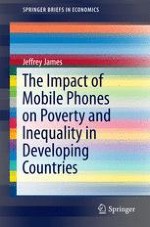2016 | OriginalPaper | Buchkapitel
4. A Pro-poor Bias: Leapfrogging and the Context
verfasst von : Jeffrey James
Erschienen in: The Impact of Mobile Phones on Poverty and Inequality in Developing Countries
Aktivieren Sie unsere intelligente Suche, um passende Fachinhalte oder Patente zu finden.
Wählen Sie Textabschnitte aus um mit Künstlicher Intelligenz passenden Patente zu finden. powered by
Markieren Sie Textabschnitte, um KI-gestützt weitere passende Inhalte zu finden. powered by
